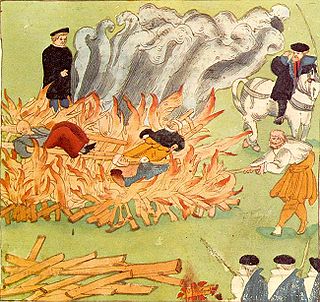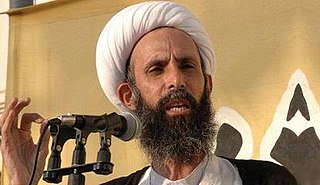Related Research Articles

A witch-hunt, or a witch purge, is a search for people who have been labeled witches or a search for evidence of witchcraft. The classical period of witch-hunts in Early Modern Europe and Colonial America took place in the Early Modern period or about 1450 to 1750, spanning the upheavals of the Reformation and the Thirty Years' War, resulting in an estimated 35,000 to 50,000 executions. The last executions of people convicted as witches in Europe took place in the 18th century. In other regions, like Africa and Asia, contemporary witch-hunts have been reported from sub-Saharan Africa and Papua New Guinea, and official legislation against witchcraft is still found in Saudi Arabia and Cameroon today.

The House of Saud is the ruling royal family of Saudi Arabia. It is composed of the descendants of Muhammad bin Saud, founder of the Emirate of Diriyah, known as the First Saudi state (1727–1818), and his brothers, though the ruling faction of the family is primarily led by the descendants of Abdulaziz bin Abdul Rahman, the modern founder of Saudi Arabia. It forms a subtribe of the larger prominent ancient Banu Hanifa tribe of Arabia, of which well known Arabian theologist Maslama ibn Ḥabīb originates. The most influential position of the royal family is the King of Saudi Arabia, an absolute monarch. The family in total is estimated to comprise some 15,000 members; however, the majority of power, influence and wealth is possessed by a group of about 2,000 of them. Some estimates of the royal family's wealth measure their net worth at $1.4 trillion. This figure includes the market capitalization of Saudi Aramco, the state oil and gas company, and its vast assets in fossil fuel reserves.

Human rights in Saudi Arabia are a topic of concern and controversy. The Saudi government, which mandates both Muslim and non-Muslim observance of Islamic law under the absolute rule of the House of Saud, has been accused of and denounced by various international organizations and governments for violating human rights within the country. The authoritarian regime ruling the Kingdom of Saudi Arabia is consistently ranked among the "worst of the worst" in Freedom House's annual survey of political and civil rights.

The Emirate of Diriyah, also known as the First Saudi State, was established in February 1727. In 1744, the emir of Najdi town called Diriyah Muhammad bin Saud and the religious leader Muhammad ibn Abd al-Wahhab formed an alliance to found a socio-religious reform movement to unify the many states of the Arabian Peninsula.
Abd al-Aziz, frequently also transliterated Abdul-Aziz, is a male Arabic Muslim given name and, in modern usage, surname. It is built from the words ʽAbd, the Arabic definite article and ʽAzīz "Almighty". The name is commonly abbreviated as "ʽAzīz". The name means "servant of the Almighty", al-ʽAzīz being one of the names of God in Islam, which give rise to the Muslim theophoric names.
Mishaal bint Fahd Al Saud was a member of the House of Saud who was executed by shooting for committing adultery in 1977, at the age of 19. She was a daughter of Prince Fahd bin Muhammad and a granddaughter of Prince Muhammad bin Abdulaziz, a son of King Abdulaziz of Saudi Arabia and the older and only full brother of King Khalid.
Capital punishment in Saudi Arabia is a legal penalty. Death sentences are almost exclusively based on the system of judicial sentencing discretion (tazir), following the classical principle of avoiding Sharia-prescribed (hudud) penalties when possible. In recent decades, the government and the courts have increasingly issued these sentences, reacting to a rise in violent crime during the 1970s. This paralleled similar developments in the U.S. and Mainland China in the late 20th century.
The Qatif rape case is a much-publicized gang rape case. The victims were a Shia young woman from Qatif and her male companion, who were kidnapped and gang-raped by seven Saudi men in mid-2006. A Saudi Sharia court sentenced the perpetrators to varying sentences involving 100 to 1,000 lashes and imprisonment up to ten years for four of them. The court also sentenced the two victims to six months in prison and 90 lashes each for "being alone with a man who is not a relative" in a parked car. The appeals court doubled the victims' sentences in late 2007 as punishment for the heavy media coverage of the event in the international press regarding the treatment of women in the Kingdom of Saudi Arabia and Saudi judicial practices. In December 2007, the Saudi King Abdullah issued an official pardon for the two victims, citing his ultimate authority to revise "discretionary" punishments in accordance with the public good, although the pardon did not reflect any lack of confidence in the Saudi justice system or in the fairness of the verdicts.

Abdullah bin Abdulaziz Al Saud was King and Prime Minister of Saudi Arabia from 1 August 2005 until his death in 2015. Prior to his ascension, he was Crown Prince of Saudi Arabia since 13 June 1982. He was the tenth son of King Abdulaziz, the founder of Saudi Arabia, and the fifth of Abdulaziz's six sons who were kings.

Saudi Arabia's laws are an amalgam of rules from Sharia, royal decrees, royal ordinances, other royal codes and bylaws, fatwas from the Council of Senior Scholars and custom and practice.

Rizana Nafeek was a Sri Lankan woman convicted and subsequently executed in Saudi Arabia for the murder of four-month-old Naif al-Quthaibi. Her parents alleged that in order to get work in Saudi Arabia, the date of birth was altered on Nafeek's passport, and in reality she was under 18 when the offence took place; this made her execution contrary to the Convention on the Rights of the Child. Nafeek claimed that her initial confession was made under duress and without linguistic assistance.

The Emirate of Jabal Shammar, also known as the Emirate of Haʾil or the Rashidi Emirate, was a state in the northern part of the Arabian Peninsula, including Najd, existing from the mid-nineteenth century to 1921. Jabal Shammar in English is translated as the "Mountain of the Shammar". Jabal Shammar's capital was Ha'il. It was led by a monarchy of the Rashidi dynasty. It included parts of modern-day Saudi Arabia, Iraq, and Jordan.

Ayatollah Sheikh Nimr Baqir al-Nimr, commonly referred to as Sheikh Nimr, was a Shia sheikh in al-Awamiyah in Saudi Arabia's Eastern Province whose arrest and execution was widely condemned, including by governments and human rights organizations.
Mishaal bin Saud Al Saud is a Saudi Arabian retired politician, businessman, and former military officer who served as the governor of the Najran Province from 1996 to 2008. He is a member of the House of Saud.
Dissidents have been detained as political prisoners in Saudi Arabia during the 1990s, 2000s and 2010s. Protests and sit-ins calling for political prisoners to be released took place during the 2011–2012 Saudi Arabian protests in many cities throughout Saudi Arabia, with security forces firing live bullets in the air on 19 August 2012 at a protest at al-Ha'ir Prison. As of 2012, recent estimates of the number of political prisoners in Mabahith prisons range from a denial of any political prisoners at all by the Ministry of Interior, to 30,000 by the UK-based Islamic Human Rights Commission and the BBC.

Salman bin Abdulaziz Al Saud is a Saudi Arabian. He is member of the Saudi royal family.
Witch-hunts are practiced today throughout the world. While prevalent world-wide, hot-spots of current witch-hunting are India, Papua New Guinea, Amazonia, and Sub-Saharan Africa. While an unknown problem in vast parts of the Western populations of the world, body-counts of modern witch-hunts by far exceed those of early-modern witch-hunting.

Abdulaziz bin Abdul Rahman Al Saud (1875–1953), the founder and first king of Saudi Arabia, also called Ibn Saud, was very young when he first married. However his wife died shortly after their marriage. Ibn Saud remarried at eighteen and his firstborn child was Prince Turki I. He had 45 sons of whom 36 survived to adulthood and had children of their own. He also had many daughters. He is thought to have had 22 wives.
On 23 April 2019, the Kingdom of Saudi Arabia carried out a mass execution of 37 imprisoned civilians who had been convicted, 21 on the basis of confessions allegedly obtained under coercion and torture, for terrorism-related allegations in six provinces in the country. Fourteen of the people executed had been convicted in relation to their participation in the 2011–12 Saudi Arabian protests in Qatif, mostly on the basis of torture-induced confessions. The executions were carried out by beheading, and two of the bodies were left on public display. According to Saudi Arabia's Interior Ministry the convicts were all Saudi nationals. Thirty-two of those executed belonged to the country's Shia minority.
On 12 March 2022, the Kingdom of Saudi Arabia carried out the mass execution of 81 men, including 7 Yemenis, 1 Syrian and 37 Saudi nationals on terrorism related charges and for holding deviant beliefs. The UN High Commissioner for Human Rights understood that 41 were minority Shia Muslims who had participated in anti-government demonstrations calling for greater political participation in 2011–2012. Rights groups accused the government of adopting restrictive regulations against religious expression and political beliefs, as well as criticising its use of the death sentence, even for children arrested, and citing the execution as a violation of human rights.
References
- ↑ "Pleas for condemned Saudi 'witch'", BBC , 14 February 2008
- ↑ "An ally who kills women" Archived 2011-04-16 at the Wayback Machine , DePers.nl , 12 April 2011
- ↑ Letter to HRH King Abdullah bin Abd al-’Aziz Al Saud on "Witchcraft" Case Archived 2008-02-18 at the Wayback Machine from Human Rights Watch
- ↑ "IHRC Urgent Alert: KSA – Woman on death penalty". Archived from the original on 2016-07-09. Retrieved 2010-05-07.
- ↑ Human Rights Watch Archived 2008-11-02 at the Wayback Machine , February 13, 2008